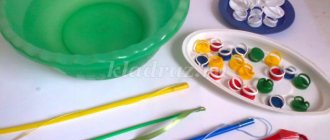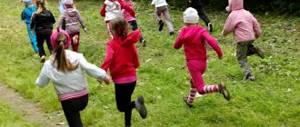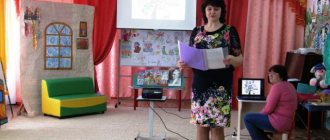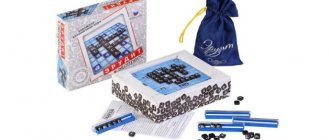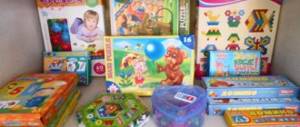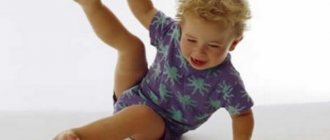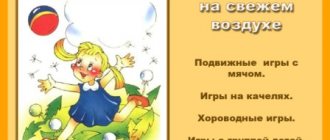MBDOU "Kindergarten No. 97" Samara
Along with the primary task of preschool institutions (protecting and strengthening the health of children), the general basis for the upbringing and education of children in kindergarten is their mastery of speech. Mastering language as a means and method of communication and cognition is one of the most important acquisitions of a child in preschool childhood. Inferior speech activity leaves an imprint on the formation of children's sensory, intellectual and affective-volitional spheres. There is insufficient stability of attention and limited possibilities for its distribution. Due to insufficient active and passive vocabulary, children with speech impairments do not always understand the teacher’s requirements. Often, speech disorders are accompanied by a delay in the development of the motor sphere, disorders of gross and fine motor skills; children experience uncoordinated movements, their slowness or, conversely, disinhibition and imprecision. In the brain, the area responsible for speech is located next to the general motor area and is actually part of it. Therefore, the development of motor speech directly depends on the development of the child’s motor skills as a whole. Most children with speech impairments have insufficiently developed motor function. It is manifested by imperfections in general motor activity, the work of facial muscles, including articulatory muscles, as well as fine movements of the hands and fingers. Children have difficulties in regulating and controlling voluntary movements, which manifests itself in the form of poor coordination of body parts. The child cannot accurately and clearly perform gymnastic exercises. Imperfect fine motor skills of the hands are revealed in the absence or poor development of self-service skills, for example, when children fasten or unbutton buttons, lace shoes, tie ribbons, and use cutlery. Insufficiency of facial and articulatory motor skills is manifested in poverty, inexpressiveness of facial movements, unclear or incorrect sound pronunciation, and slurred speech. The participation of the motor system in the development of speech explains the high importance of active stimulation of the development of all components of the child’s motor sphere—the muscles responsible for general movements, subtle hand movements, articulation and facial expressions. Outdoor games occupy a special place in the development, health improvement and rehabilitation of preschool children. Play is a child’s natural state, his main activity. Playful activities for preschoolers are a way of learning about their surroundings. Its use contributes to the improvement of motor skills, consolidation of achieved results, and children’s enjoyment of the game process. Long-term pedagogical observations of specialists show that a variety of outdoor games are an effective means of preventing and correcting speech disorders in children in the process of physical education. For this purpose, outdoor games (high, medium, low mobility) are used in practice:
Outdoor play as a means of developing the speech of a preschooler
Outdoor play as a means of development
preschooler's speech
“Speech is an amazingly powerful tool,
but you need to have a lot of intelligence to use it"
Georg Hegel
The problem of language proficiency has long attracted the attention of various researchers and teachers.
Speech is one of the important lines of the comprehensive development of a child. It is closely related to his intellectual development. The richer and more correct a child’s speech, the easier it is for him to express his thoughts, the wider his opportunities for understanding the surrounding reality, the more meaningful and fulfilling his relationships with peers and adults, the more active his mental development is.
Our speech is very complex and varied, so it is necessary to develop it from the first years of life.
Communication is the leading means of speech development; it is carried out in various types of activities: educational, household, work, play.
I work with a group of older children of different ages (4-6 years old).
The level of speech development of preschool children is insufficient.
In my work, I pay great attention to the development of speech in preschoolers through active play with vocabulary support.
The topic of my speech: “ Outdoor play as a means of developing the speech of a preschooler”
According to P.F. Lesgaft’s definition, “outdoor play is an exercise through which a child prepares for life.”
Preschool age is a unique and decisive period in the development of a child, when the foundations of personality emerge, will and voluntary behavior are formed, imagination, creativity, and general initiative actively develop. However, all these most important qualities are formed not in educational activities, but in the leading and main activity of a preschooler - in play.
Play is an effective means of comprehensive development of a child’s personality; it is an effective method and one of the forms of training and education that stimulates children’s speech activity.
In the game, the child gains useful knowledge about the surrounding reality in practice. Like any creative activity, play brings joy to children, is of great importance and contributes to the development of all the qualities necessary for further learning.
The advantage of play over any other children's activity is that in it the child himself, voluntarily obeys certain rules, and it is the implementation of the rules that gives maximum pleasure. This makes the child’s behavior meaningful and conscious. Therefore, play is practically the only area where a preschooler can show his initiative and creative activity.
It is through play that children learn to control and evaluate themselves, understand what they are doing, and want to act correctly.
I would like to pay special attention to outdoor games with vocabulary accompaniment. These games have an impact on enriching vocabulary and nurturing sound culture.
Word games for children are not only attractive, but also useful. Speech games are of great importance for the development of children's speech and thinking; they activate, enrich their vocabulary, improve phonemic hearing in children, and instill interest and love for language.
Outdoor games include a literary text, a poem prescribing one or another game action (“Owl”, “Horses”, “Shaggy Dog”, etc.). First, when suggesting a new game, I myself clearly and expressively read the poem related to it. During the game, poems are read several times. Children quickly remember the text of the verse and pronounce it themselves during the game.
During the game, I strive to encourage children to imitate speech activity and expand their understanding of speech and vocabulary. This is achieved by reciting poems, nursery rhymes, and verbal accompaniment of outdoor games with the children.
Each game has its own rules.
Intelligent, thorough, repeated explanation of the rules of the game to children, joint discussion with them of the conditions for its implementation is already the path to the development of their language. I encourage the children to clearly explain the rules of this or that game to their comrades who are still unfamiliar with it. Sometimes I suggest that the whole group of children talk together about how we conduct this or that game. I attach great importance to such statements.
In my work I use methodological literature and Internet resources. As well as ready-made developments of outdoor games “Games and exercises for the development of general speech skills in children” author: Bizikova O.A. with texts, for example: “King”, “Kite”, “Snake”, “Foxes”, etc., with various movements and singing: “The neighbor is better”, “In an even circle”, “Carousel”, “Hen and Chicks” , “Sparrows and the car”, “Owl”; round dance games: “Echo”, “Pots”, “Mousetrap”.
I have made a selection of outdoor games with verbal accompaniment and drawn up an annual plan for studying outdoor games. Every month we learn a new outdoor game with the children.
I bring to your attention a video recording of the outdoor game “At the Bear in the Forest...”, “The Sea Is Troubled.”
I believe that this form of speech development in preschoolers, such as active play with verbal accompaniment, encourages children to make contacts and is a motive for communicative activities. Children develop the ability to play and communicate with peers, and the desire to participate in joint group activities.
Outdoor games are the most universal and accessible means of children's development. Games have a comprehensive, complex effect on the child’s body, contributing not only to the physical, but also to the moral, mental, labor and aesthetic education of preschoolers. With the help of various play movements and situations, the child learns about the world, receives new information and knowledge, and masters speech.
The use of outdoor games with verbal accompaniment can give positive dynamics to speech development.
Play is organically inherent in childhood and with skillful guidance
on the part of adults it can work wonders.
Playing – developing – teaching – educating
Outdoor game with speech accompaniment
Lexical topic “Fruits. Vegetables"
| We walked around the garden and saw birds on the apple trees. I went to the garden with friends, | We collected the vegetables ourselves. The harvest was deftly harvested - both cabbage and carrots! |
Outdoor switchgear complex “In the garden, in the vegetable garden”
"Apple trees reach for the sun"
I.p. legs apart, arms down; 1 - arms up - to the sides; 2 – arms through the sides down. Repeat 4 times.
"Scaring away the birds"
IP: legs slightly apart; 1-2 - arms to the sides; 3-4 - down, make two claps on the thighs, say “clap, clap.” Repeat 5 times.
“Collecting vegetables in a basket”
IP: legs apart, arms in a semicircle in front of you, fingers touching each other, elbows raised; 1-2 - lean forward, reach with your hands to your toes; 3-4 - return to i. p. Repeat 4-5 times.
“Ay-ay, we have harvested!”
I.p.: legs together, hands on the belt. Perform 8-10 light, soft jumps. Alternate jumping with walking. Repeat 2-3 times.
Repeat the first exercise.
Outdoor game “Watchman and Hares”
On one side of the site a place for the “watchman” is outlined. On the other side there are houses for “hares”. There are 2-3 “hares” in each house. The "watchman" walks around the area - the "vegetable garden", pretending that he is looking for traces of the "hares", checking whether they have gnawed the fruit trees, whether they have eaten carrots and cabbage; then the “watchman” returns to his place. At the teacher’s signal, the “hares” run out of their houses into the garden, jump on two legs, moving forward, and squat down - “gnaw vegetables.” At the teacher’s signal, “The watchman is coming!” The “hares” run into the houses, and the child, pretending to be a watchman, tries to catch one of them. The “watchman” takes the caught child to his place. The game is repeated twice, after which a new guard is chosen.
Note. At the beginning of the game, the teacher can represent the guard.
Outdoor game with speech accompaniment
"In the kids' garden"
Children form a circle and stand facing the center.
| In the children's garden there are many, many flat beds. | They walk in place, raising their knees high. |
| Peas and onions grow there, tomatoes and cabbage, cucumbers and zucchini, eating them is very, very tasty. | They perform a “spring” by clapping their hands. |
| We will walk with a basket, we will pick up vegetables. | They walk in a circle, one after another. |
| Let's run along the ridges with friends, shout loudly to mom: | They run in circles after each other. |
| “Doors, mom, open! | They imitate a knock on the door. |
| We are bringing our harvest!” | Spread your arms to the sides, lean forward slightly. |
Low mobility game "Guess"
Children form a circle and hold hands. At a signal from the teacher standing in the center of the circle, they begin to move to the right, saying the following text:
Guess what, guess what?
Come on, play with us!
We'll guess your riddles,
We know vegetables and fruits.
The teacher gives the command “Stop!”, the children stop. The teacher calls someone's name, determining which of the children will guess the name of the vegetable or fruit based on the teacher's description.
Teacher. Sasha, guess! This vegetable is green in color, it has a lot of clothes and all without fasteners, inside there is a white, sweet stalk.
Sasha. This is cabbage.
Teacher. Sveta! This vegetable grows in the ground, it is red in color, with a long tail, round, like a small ball.
Sveta. This is a radish.
(And so on.)
Notes. 1. The teacher can take for the game a set of didactic pictures with images of vegetables and fruits necessary for the game. 2. If a child finds it difficult to answer, you need to help him and supplement your description with the necessary clarifications. 3. Help from other children in answering is acceptable.
Lexical topic “Gifts of the Forest”
| We will go to the forest in the fall and find mushrooms there. How can we find a mushroom in the grass? | So let's put it in the box. We'll collect the full body and take the body to Mom. |
Outdoor switchgear complex “In the forest”
"Breathe the forest air"
I. p.: legs apart, arms down; 1 - arms up - to the sides; 2 - arms through the sides down. Repeat 4 times.
"We drive away mosquitoes"
I. p.: legs slightly apart, arms down; 1 - hands forward; 2 - up, wave your hands, look at them; 3-4 - arms through the sides down. Repeat 4 times.
"Looking for mushrooms"
I. p.: legs apart, arms down; 1-2 - bend forward without bending
knees, arms to the sides, head straight - exhale; 3-4 - and. p. Repeat 4-5 times.
"Hello, fungus"
I. p.: legs slightly apart, hands on the waist; 1-2 - sit down, tap your fingers on the toes of your shoes, say “I see”; 3-4 - and. p. Repeat 4-5 times.
“Mushrooms, in the basket!”
I. p.: legs slightly apart, hands on the waist. Perform 8-10 jumps. Repeat 3 times, alternating with walking.
Repeat the first exercise.
Outdoor game “Naughty mushrooms”
A circle is outlined on the site - a “mushroom picker’s basket”. There are “mushroom” children in the basket. The reader selects a “mushroom picker” who squats 2-3 m from the circle - he walked through the forest for a long time, got tired, fell asleep. The teacher reads the text:
A mushroom picker sits on a stump,
Resting, sleeping soundly.
Hush, hush, don't make noise,
Don't wake up the mushroom picker!
The “mushroom” children run out of the “basket,” jump, and play pranks on the lawn. The teacher says: “The mushroom picker has woken up!” After the teacher’s words, the “mushroom picker” wakes up, sees that “the mushrooms have scattered” - they have fled, and begins to catch up with the children - “collecting mushrooms in a basket.” The “mushroom” children must have time to run into the “basket” before the “mushroom picker” touches them. The one whom the “mushroom picker” has stained becomes the next “mushroom picker” driver.
Outdoor game with speech accompaniment
“We’ll take the basket”
| We'll take a basket and go into the forest to pick berries. | They walk in a circle one after another. |
| One, two, three, four, five, Let's look for berries. | They stop, perform a “spring”, and clap their hands. |
| Let's run down the path | They run in circles. |
| Let's jump over the puddles. | They jump on two legs. |
| We'll look under the leaves - | They squat. |
| Let's pick some berries for dinner: | They imitate picking berries with their hands. |
| Blackberries and raspberries, Blueberries and viburnums. | They walk in place. |
| Bunches of ripe lingonberries and some wild strawberries. | They perform a “spring” and clap their hands. |

